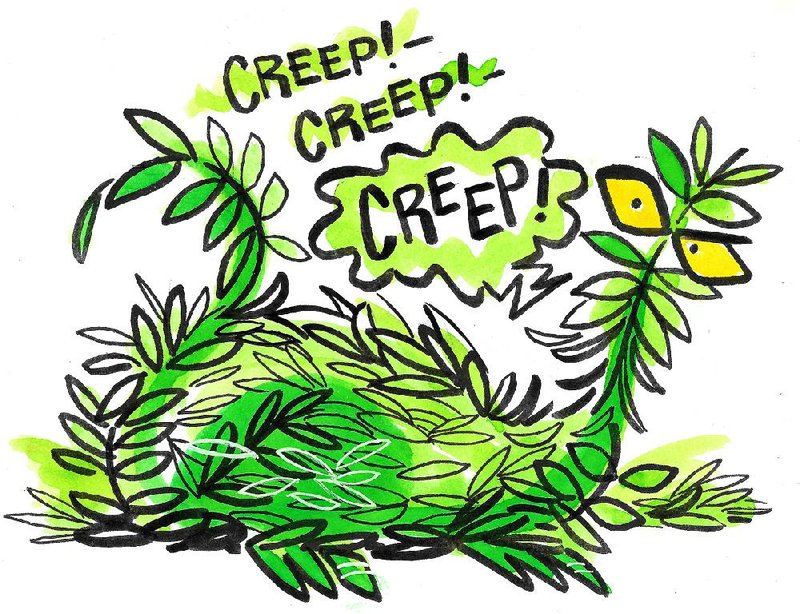Q Years ago, I inadvert-ently got a start of creeping euonymus in some potted bushes or other potted ornamentals. I didn't mind it for a while, as it was attractive and not a problem. My mistake. Now, it is consuming my yard, and I'm getting so old I can't fight it. I've tried to spray it with broadleaf weed killer, and brush killer, but they barely turn a couple leaves a bit off color. Is there anything recommended to work on this nuisance? Or add to a spray to cut through the waxy leaf so it can absorb the herbicide?
A You nailed the problem on the head. Waxy outer layers of leaves do repel the herbicide. There are two things you can do to make herbicides more effective. One is break up the waxy cuticle by mowing over the groundcover or using a weed-eater on it. Then spray. You can also buy what is called sticker-spreader. It is a material that is added to the spray mix; the "spreader" component is a surfactant that reduces the surface tension of water. This allows the product to spread across the leaf more uniformly and allows the active ingredient to be better absorbed by the plant. The "sticker" component increases the adhesion of spray drops to the leaf and slows loss of the chemical to rain.
Q Is there anything I can spray to get rid of the bermuda grass and keep my Echinacea? I'm really tired of weeding my bed over and over. Using a post-emergence grass herbicide with an oil concentrate is somewhat effective but very short-lived. Do you have any suggestions? I seem to be wearing out a lot of garden gloves.
A Bermuda grass often grows better where we don't want it, versus in the lawn. Unfortunately it is a perennial weed, so pre-emergent herbicides don't work. The grass-specific herbicide does work, but only kills what is growing where it lands -- it doesn't prevent bermuda from spreading back in. Clean out as much of the grass as you can, leaving an 8- to 12-inch buffer zone between lawn and flower bed, and keep that edged to prevent the bermuda from encroaching. Mulch well.
Q I'd like to know what a good systemic insecticide for annuals is. Also, when and how often should one use it?
A Annuals are just with us one season, and I rarely recommend a spray program for them. Choose plants that you don't need to spray, and scout frequently to catch pests quickly. There are broad-spectrum insecticides that work for a range of pests, but only use if needed.
Q I live in Hot Springs Village. I have a large maple tree that is probably 70 feet tall (or more) plus nine large oak trees. The maple has been shedding leaves all summer and appears to have many dead branches that never produced leaves. There is no bleeding near the base and no sign of insects. Part of the root system is under my lawn, so it gets plenty of water. I had someone come look at it and he found no evidence of disease. I am thinking of removing it because I think it is dying. What do you think?
A It sounds like your tree is definitely stressed. Trees often take a long time to completely die. You have several options. One is remove it now. You can also wait until next spring and assess how much life is left in the tree. If there is less than 50 percent life left in it, remove it; if there is still enough life left in it, then prune out the dead wood and see what happens. Maples do like moisture. It sounds as if you have plenty of shade, so losing one tree may not be a huge loss, but I try to save as many trees as possible.
Janet B. Carson is a horticulture specialist for the University of Arkansas Cooperative Extension Service. Write to her at 2301 S. University Ave., Little Rock, Ark. 72204 or email her at
jcarson@arkansasonline.com
HomeStyle on 11/04/2017
